Student Competitions as a Learning Method with a Sustainable Focus in Higher Education: The University of Seville “Aura Projects” in the “Solar Decathlon 2019”
Abstract
1. Introduction
2. Sustainability as a Learning Methodology in Higher Education
3. Methodology
- The Solar Decathlon sustainable architecture competition was selected as a tool and strategy to break the rigid departmental structure of the US, while generating a methodology for teaching innovation.
- For the presentation to the competition, the Aura Strategy was proposed, based on two lines of action:
- The constitution of a network of teachers between departments, subjects and centres in the US that offer varying support to the process of the genesis of Projects 3.0-3.1.
- The construction of a teaching methodology based on problem-solving and included in the subjects of the Fundamentals of Architecture Degree, where through responding to the different phases or training cycles (project, financing, definition of systems, prefabrication, transport, assembly, monitoring and disassembly) learning environments are generated with a holistic approach to conceptual, procedural and attitudinal content.
- Evaluation of the learning environments generated from the results obtained in the competition.
- Conclusions. Advantages and disadvantages that became evident after the experience of participation in the competition.
4. Case Study
4.1. The Solar Decathlon Competition
4.2. The Aura Strategy in The Latin American and Carbibbean 2019 and Europe 2019 Editions of The Solar Decathlon Competition
4.2.1. Teaching Network
4.2.2. Innovation in Teaching Methodology in the Fundamentals of the Architecture Degree: Project 3.0 and 3.1 Prototype Design
Stage 1: Inception
Stage 2: Development of Design and Construction Documents
Stage 3: Material Development
Stage 4: Competition
Stage 5: Disassembly
5. Results and Discussion
- Innovative learning environments. Through participation in the SDC, students are required to incorporate innovation as a tool of creation as set out in the structure of the competition. Indeed, one of the tests they face is "Innovation and Engineering". In order to do so, they must learn to incorporate nonconventional construction and energy efficiency technologies into the design process, which will bring uniqueness to the prototype presented to the competition.
- Collaborative learning environments among students. One of the fundamental values of this teaching experience is the need to generate an organisational learning model that manages human resources with the participation of more than fifty students and twenty teachers from different centres and disciplines. A system of planning, control and information transmission is needed to facilitate the communication of actions and of the documentation generated, eliminating concepts acquired in noncollective work, such as individual defensive routines, the centralisation of decisions [50] and the concept of authorship.
- Research learning environments. This research is aligned with the trend that advocates that learning, understood as the increase of a person’s capacity to carry out effective actions, is based on two aspects that feedback each other. The process itself becomes an experimental laboratory that allows the channelling and acquisition of concepts through the manufacture and execution of real tasks that have been previously projected. In this way, and in a transversal way, students must find the balance between the projected design, its functionality and aesthetics and the tools, materials, means and economy they have at their disposal to carry it out.
- ICT learning environment. The nature of the competition urges participants to operate in an environment that implements all possible tools, both in terms of design and information management. In this way, 3D design programs, BIM environments, energy behaviour simulation programs, programs for construction life cycle analysis and waste management and various online applications and platforms for managing the communication section were used.
- Networking learning environments for teachers. The teaching network that has been created for the incorporation of different disciplines into this collective experience has been explained in previous sections. This network, sometimes virtual and sometimes face-to-face, serves as a model for the students themselves to generate collaborative work dynamics and enhance group work strategies. The participation of teachers from different disciplines, the combination of theoretical and practical classes and the mixture of students from different courses, subjects and ages has ensured the transdisciplinarity and transversality of the process, as opposed to the line traditionally drawn by the study plans of the Fundamentals of Architecture Degree [17].
- Assessment learning environments. The SDC, in addition to the design, construction, transport and assembly phases in which the know-how processes are concentrated, has an implicit evaluation phase. In this phase, the organisation establishes a classification among the participants in the ten categories in which they compete and awards the consequent prizes. In this evaluation phase, the ESD-US won two first prizes and a third prize. This evaluation implies, besides recognition for the students, an opportunity for criticism and later reflection on the nature of the experience. In addition, the TFM and TFG works carried out from processes related to the competition in different disciplines can also be considered as evaluation indicators.
6. Conclusions
Author Contributions
Funding
Acknowledgments
Conflicts of Interest
References
- Baumber, A.; Kligyte, G.; van der Bijl-Brouwer, M.; Pratt, S. Learning together: A transdisciplinary approach to student–staff partnerships in higher education. High. Educ. Res. Dev. 2019, 1–16. [Google Scholar] [CrossRef]
- Yániz, C.; Villardón, L. Planificar Desde Competencias Para Promover el Aprendizaje (Vol. 12); Universidad de Deusto: Bilbao, España, 2008. [Google Scholar]
- Jæger, K. New-style higher education: Disciplinarity, interdisciplinarity and transdisciplinarity in the EHEA qualifications framework. High. Educ. Policy 2018, 1–20. [Google Scholar] [CrossRef]
- Neuhauser, L.; Pohl, C. Integrating transdisciplinarity and translational concepts and methods into graduate education. In Transdisciplinary Professional Learning and Practice; Gibbs, P., Ed.; Springer: Basel, Switzerland, 2015; pp. 99–120. [Google Scholar] [CrossRef]
- Barrette, C.M.; Paesani, K.; Vinall, K. Toward an integrated curriculum: Maximizing the use of target language literature. Foreign Lang. Ann. 2010, 43, 216–230. [Google Scholar] [CrossRef]
- Bates, M. Work-integrated curricula in university programs. High. Educ. Res. Dev. 2008, 7, 305–317. [Google Scholar] [CrossRef]
- Sáez, I.A.; Sancho, N.B. The integrated curriculum, university teacher identity and teaching culture: The effects of an interdisciplinary activity. J. New Approaches Educ. Res. 2017, 6, 127–134. [Google Scholar] [CrossRef]
- Garraway, J. Creating productive interactions between work and the academy. High. Educ. 2006, 52, 447–464. [Google Scholar] [CrossRef]
- Amundsen, C.; Wilson, M. Are we asking the right questions? A conceptual review of the educational development literature in higher education. Rev. Educ. Res. 2012, 82, 90–126. [Google Scholar] [CrossRef]
- Escribano, A.; del Valle, Á. El Aprendizaje Basado en Problemas: Una Propuesta Metodológica en Educación Superior; Narcea Ediciones: Madrid, España, 2008. [Google Scholar]
- Ortiz Cermeño, E. El aprendizaje basado en problemas como experiencia de innovación y mejora docente universitaria. Perf. Educ. 2019, 41, 208–213. [Google Scholar] [CrossRef]
- Unesco. UN Decade of Education for Sustainable Development 2005–2014: The DESD at a Glance; Unesco: París, France, 2005. [Google Scholar] [CrossRef]
- United Nations. Implementation of the Outcomes of the United Nations Conferences on Human Settlements and on Housing and Sustainable Urban Development and Strengthening of the United Nations Human Settlements Programme (UN-Habitat); United Nations: New York, NY, USA, 2016; Available online: http://habitat3.org/wp-content/uploads/N1639668-English.pdf (accessed on 15 December 2019).
- Pereira Roders, A.; Van Oers, R. Editorial: Bridging cultural heritage and sustainable development. J. Cult. Herit. Manag. Sustain. Dev. 2011, 1, 5–14. [Google Scholar] [CrossRef]
- Leal Filho, W.; Shiel, C.; Paço, A.; Mifsud, M.; Veiga Ávila, L.; Londero Brandli, L.; Molthan-Hill, P.; Pace, P.; Azeiteiro, U.M.; Ruiz Vargas, V.; et al. Sustainable development goals and sustainability teaching at universities: Falling behind or getting ahead of the pack? J. Clean. Prod. 2019, 232, 285–294. [Google Scholar] [CrossRef]
- Boarin, P.; Martinez-Molina, A.; Juan-Ferruses, I. Understanding students’ perception of sustainability in architecture education: A comparison among universities in three different continents. J. Clean. Prod. 2019, 119237. [Google Scholar] [CrossRef]
- Universidad de Sevilla. Plan De Estudios De Graduado/a En Fundamentos De Arquitectura Por La Universidad De Sevilla; Universidad de Sevilla: Sevilla, España, 2014; pp. 37829–37834. Available online: http://webapps.us.es/fichape/Doc/MVBOE/233_memVerBOE.pdf (accessed on 17 October 2019).
- United Nations. Transforming Our World: The 2030 Agenda for Sustainable Development (A/RES/70/1); United Nations: New York, NY, USA, 2015; Available online: https://www.un.org/en/development/desa/population/migration/generalassembly/docs/globalcompact/A_RES_70_1_E.pdf (accessed on 13 December 2019).
- Owens, T.L. Higher education in the sustainable development goals framework. Eur. J. Educ. 2017, 52, 414–420. [Google Scholar] [CrossRef]
- High Level Group on the Modernisation of Higher Education. Report to the European Commission on New Modes of Learning and Teaching in Higher Education; Publications Office of the European Union: Luxembourg, 2014. [Google Scholar] [CrossRef]
- Schwartzstein, R.; Roberts, D.H. Saying goodbye to lectures in medical school- paradigm shift or passing fad? N. Engl. J. Med. 2017, 377, 605–607. [Google Scholar] [CrossRef] [PubMed]
- Escotet, M.A. Globalización y educación superior: Desafíos en una era de incertidumbre. In Pedagogía Universitaria, Hacia Un Espacio De Aprendizaje Compartido (Vols. 1-2, Vol. 1); Universidad de Deusto, Instituto de Ciencias de la Educación: Bilbao, España, 2004; pp. 23–36. [Google Scholar]
- Bain, K. Lo Que Hacen Los Mejores Profesores Universitarios; Publicaciones de la Universidad de Valencia: Valencia, España, 2017. [Google Scholar]
- Finkel, D. Dar Clase Con La Boca Cerrada; Publicaciones de la Universidad de Valencia: Valencia, España, 2008. [Google Scholar]
- Beyer, L.E. William Heard Kilpatrick. Prospects 1997, 27, 468–485. [Google Scholar] [CrossRef]
- Figueroa, C.; Sánchez Cubides, P.A. De las ciencias pedagógicas a la psicopedagogía. Un aporte histórico a la educación—From pedagogical sciences to psychopedagogy. A historical contribution to education. Rev. Espac. 2018, 39, 26. Available online: http://www.revistaespacios.com/a18v39n20/18392026.html (accessed on 12 November 2019).
- Vlachou-Vlachopoulou, A.G.; Pavlides, S.V. Education in natural sciences: A journey through time. AIP Conf. Proc. 2019, 2075, 180006. [Google Scholar] [CrossRef]
- Bruner, J.S. El Proceso Mental En El Aprendizaje (Vol. 88); Narcea Ediciones: Valencia, España, 2001. [Google Scholar]
- Elliott, J. The teacher’s role in curriculum development: An unresolved issue in english attempts at curriculum reform. Curric. Stud. 1994, 2, 43–69. [Google Scholar] [CrossRef]
- López de Asiain, M.; Pérez del Real, P.; López de Asiain, J. New opportunities in teaching sustainability in Spain by competences. In PLEA 2011–Architecture and Sustainable Development, Proceedings of the 27th International Conference on Passive and Low Energy Architecture, Louvain-la-Neuve, Belgium, 13–15 July 2011; pp. 101–106. Available online: https://books.google.es/books?id=KKZMp2kotAEC&pg=PA101&lpg=PA101&dq=New+opportunities+in+teaching+sustainability+in+Spain+by+competences&source=bl&ots=zw1Yy3Tggq&sig=ACfU3U3Qb5grjVUFYYADh2NSSedKiiJlPA&hl=es-419&sa=X&ved=2ahUKEwjbsrD4xufmAhUHxIUKHagIBEEQ6AEwA3oECAoQAQ#v=onepage&q=New%20opportunities%20in%20teaching%20sustainability%20in%20Spain%20by%20competences&f=false (accessed on 3 January 2020).
- Anker, P. From Bauhaus to Ecohouse: A History of Ecological Design; Louisiana State University Press: Baton Rouge, LA, USA, 2010. [Google Scholar]
- Phelan, A. The Bauhaus and studio art education. J. Art Educ. 1981, 34, 6–13. [Google Scholar] [CrossRef]
- Trimingham, M. A methodology for practice as research. Stud. Theatr. Perform. 2002, 22, 54–60. [Google Scholar] [CrossRef]
- Herrera-Limones, R.; León-Rodríguez, Á.L.; López-Escamilla, Á. Solar decathlon latin america and caribbean: Comfort and the balance between passive and active design. Sustainability 2019, 11, 3498. [Google Scholar] [CrossRef]
- Solar Decathlon LatinAmerica & Caribbean. RULES Final Version Solar Decathlon LatinAmerica & Caribbean. 2015. Available online: www.solardecathlon2015.com.co (accessed on 13 October 2019).
- Terrados, F.J.; Moreno, D. ‘Patio’ and ‘Botijo’: Energetic strategies’ architectural integration in ‘Patio 2.12’ prototype. Energy Build. 2014, 83, 70–88. [Google Scholar] [CrossRef]
- Terrados-Cepeda, F.J.; Baco-Castro, L.; Moreno-Rangel, D. Patio 2.12: Vivienda prefabricada, sostenible, autosuficiente y energéticamente eficiente. Participación en la competición Solar DecathlonEurope 2012. Inf. Construcción 2015, 67, 538. Available online: http://informesdelaconstruccion.revistas.csic.es/index.php/informesdelaconstruccion/article/view/4231/4888 (accessed on 12 December 2019). [CrossRef]
- Serra Soriano, B.; Verdejo Gimeno, P.; Díaz Segura, A.; De La Maza, R.M. Assembling sustainable ideas: The construction process of the proposal SMLsystem at the Solar Decathlon Europe 2012. Energy Build. 2014, 83, 185–194. [Google Scholar] [CrossRef]
- Herrera-Limones, R.; Gómez García, I.; Borrallo Jiménez, M.; Iglesia Salgado, F.D.L.; Domínguez Delgado, A.; Gil Marti, M.A.; Granados Cabrera, M.; López, E.; Roa-Fernández, J.; Serrano Fajardo, J. Solar decathlon latino América y Caribe. Cali 2015 (Colombia), Proyecto AURA. In Proceedings of the II International Congress on Sustainable Construction and EcoEfficient Solutions, Seville, Spain, 25–27 May 2015; pp. 769–781. Available online: https://idus.us.es/xmlui/handle/11441/59659 (accessed on 19 December 2019).
- Herrera Limones, R.; Acebal, J.V.; Martínez, A.G.; Jimenez, M.B.; López, J.G. Proyecto aura. escuela de arquitectura de la universidad de sevilla. In XIII Bienal Española De Arquitectura y Urbanismo_Alternativas = 13th Spanish Architecture and Urbanism Biennial:Alternatives; Ministerio de Fomento: Madrid, España, 2016; p. 420. [Google Scholar]
- UNESCO. Transforming Our World: The 2030 Agenda for Sustainable Development; Unesco: París, France, 2015; Available online: https://sustainabledevelopment.un.org/post2015/transformingourworld/publication (accessed on 18 September 2019).
- Department of Energy of USA. Solar Decathlon. Competition Guide 2019–2020. Available online: https://www.solardecathlon.gov/assets/pdfs/sd-competition-guide.pdf (accessed on 14 September 2019).
- Kim, D. The link between individual and organizational learning. Sloan Manag. Rev. 2004. [Google Scholar] [CrossRef]
- Egido, I.T.; Romero, Y.M. Un acercamiento al aprendizaje basado en proyectos, cien años después de “The Project method”, de W. H. Kilpatrick. Rev. Electrónica Interuniv. Form. Profr. 2018, 21, 2. [Google Scholar]
- European Ministers in Charge of Higher Education. Towards the European Higher Education Area; Czech Republic, Prague 2001. Available online: http://www.sedem.org/Comunicado%20de%20Praga-2001.pdf (accessed on 20 January 2009).
- Mut Camacho, M. Procesos De Aprendizaje De Vanguardia En La Enseñanza Superior; ACCI: Madrid, España, 2014. [Google Scholar]
- Svarzman, J. La Enseñanza De Los Contenidos Procedimentales. El Taller De Ciencias Sociales; Novedades Educativas: Buenos Aires, Argentina, 1998. [Google Scholar]
- Giribuela, W.; Travi, B. El proceso de enseñanza-aprendizaje de los contenidos procedimentales en la asignatura Trabajo Social II de la Carrera licenciatura en trabajo social de la Universidad nacional de luján (UNLu). Acciones Investig. Soc. 2006, 1, 424. Available online: http://ts.ucr.ac.cr/binarios/pela/pl-000387.pdf (accessed on 12 November 2018).
- Piqué, B.; Forés, A. Propuestas Metodológicas Para La Educación Superior; Universitat de Barcelona: Barcelona, España, 2012; Available online: http://hdl.handle.net/2445/30702 (accessed on 15 January 2019).
- Martínez Pérez, J.F. Factores que dificultan el aprendizaje organizativo. In La Gestión De La Diversidad: XIII Congreso Nacional, IX Congreso Hispano-Francés, Logroño (La Rioja), 16, 17 y 18 De Junio, 1999; Universidad de La Rioja: La Rioja, España, 1999; pp. 671–676. [Google Scholar]
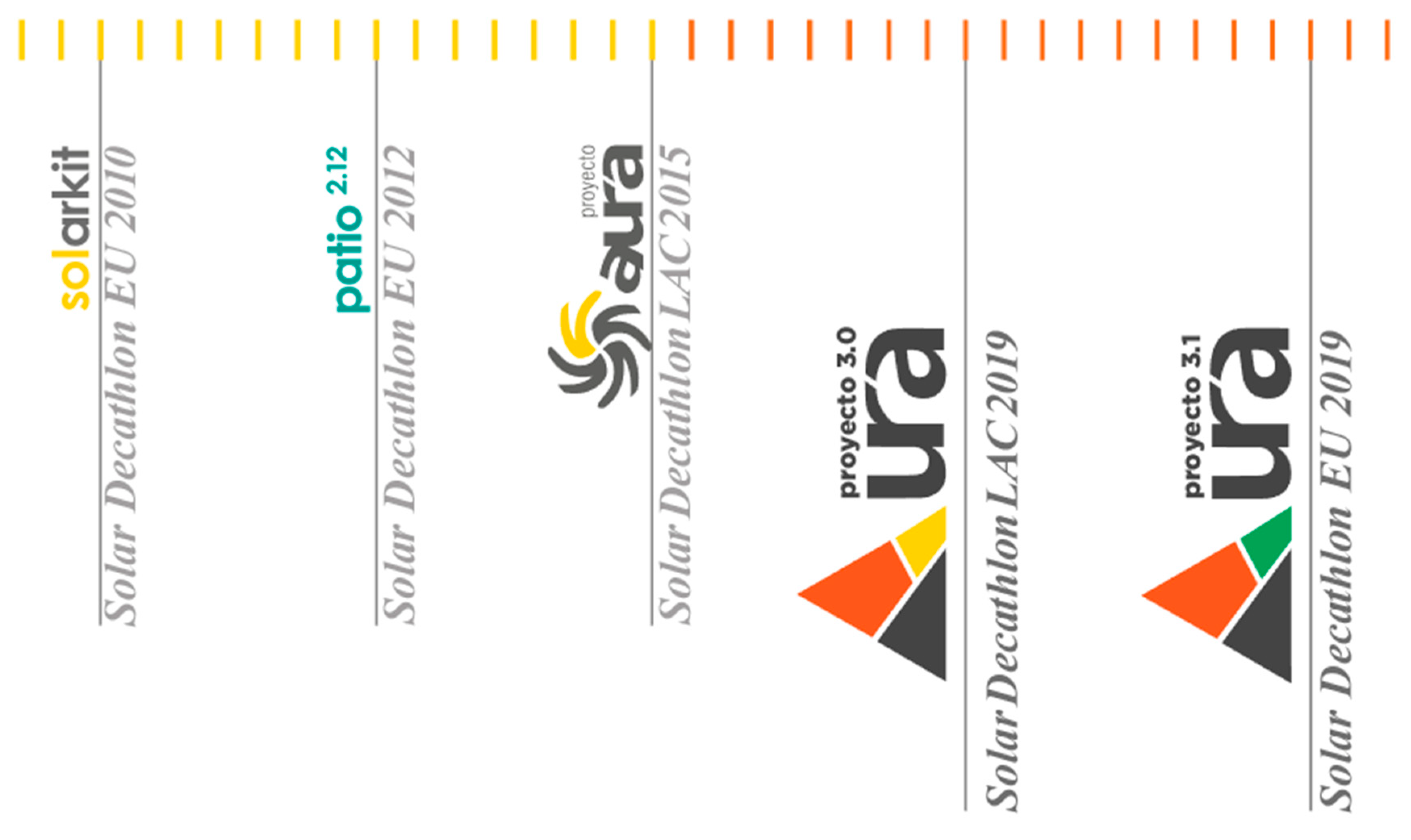
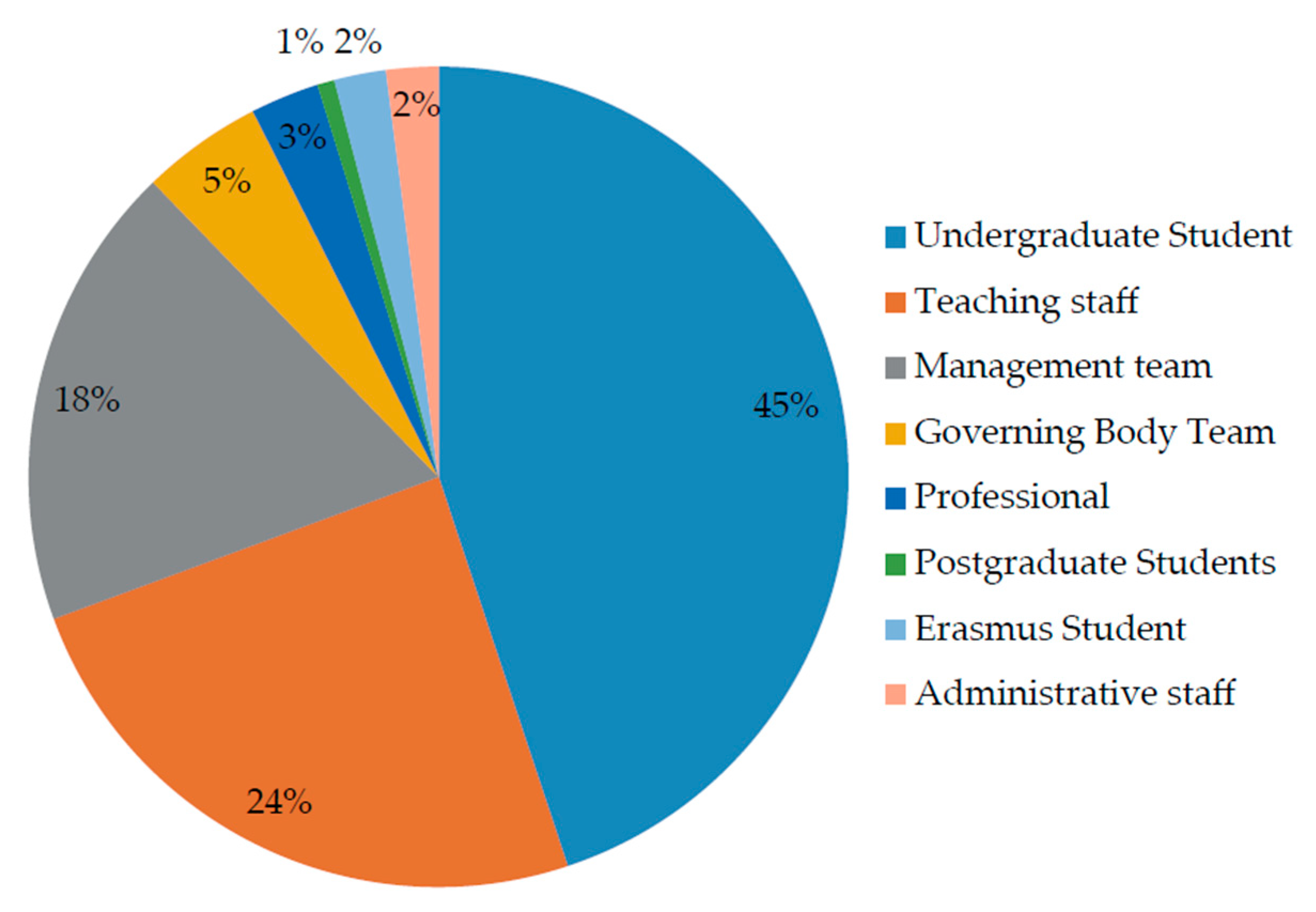


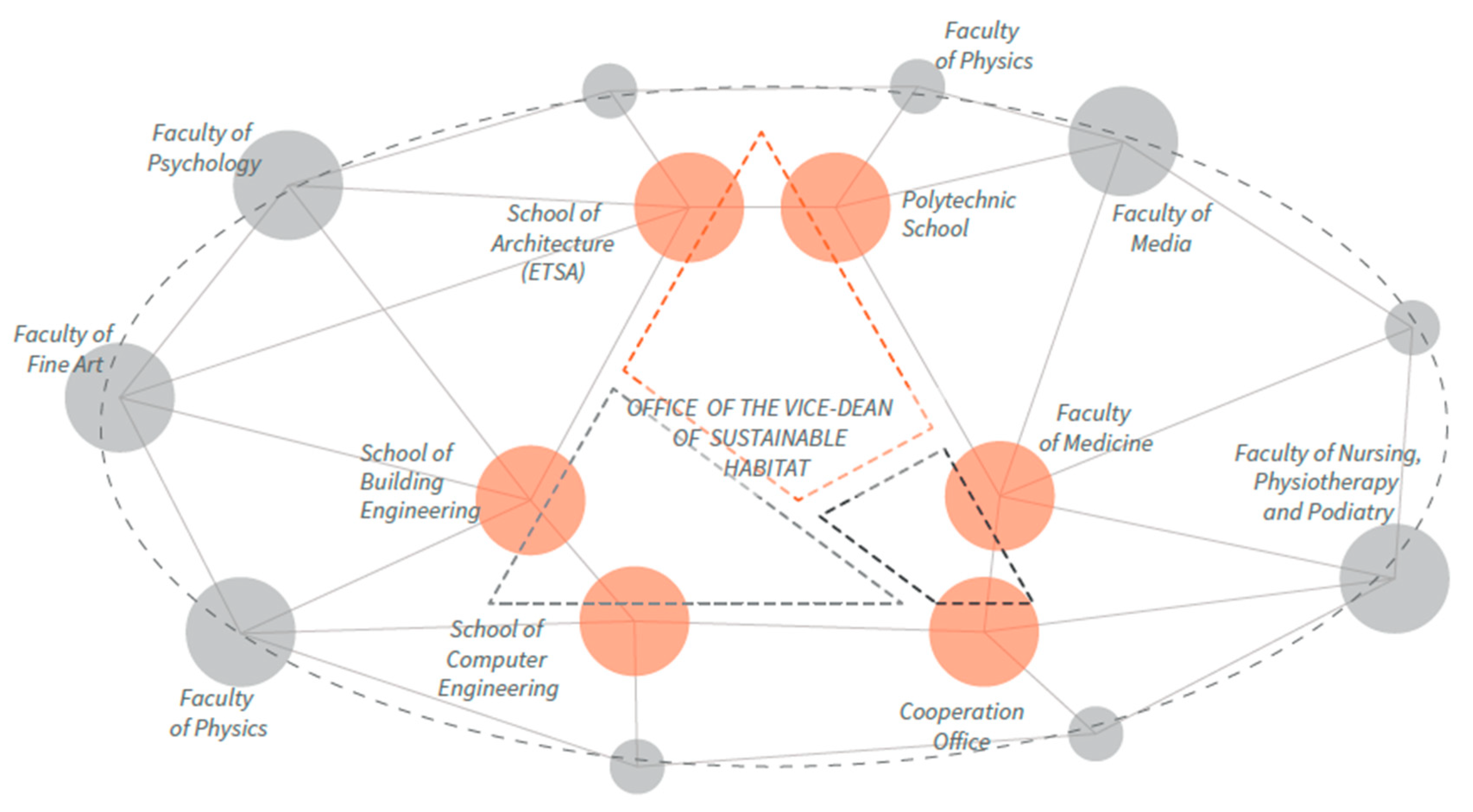
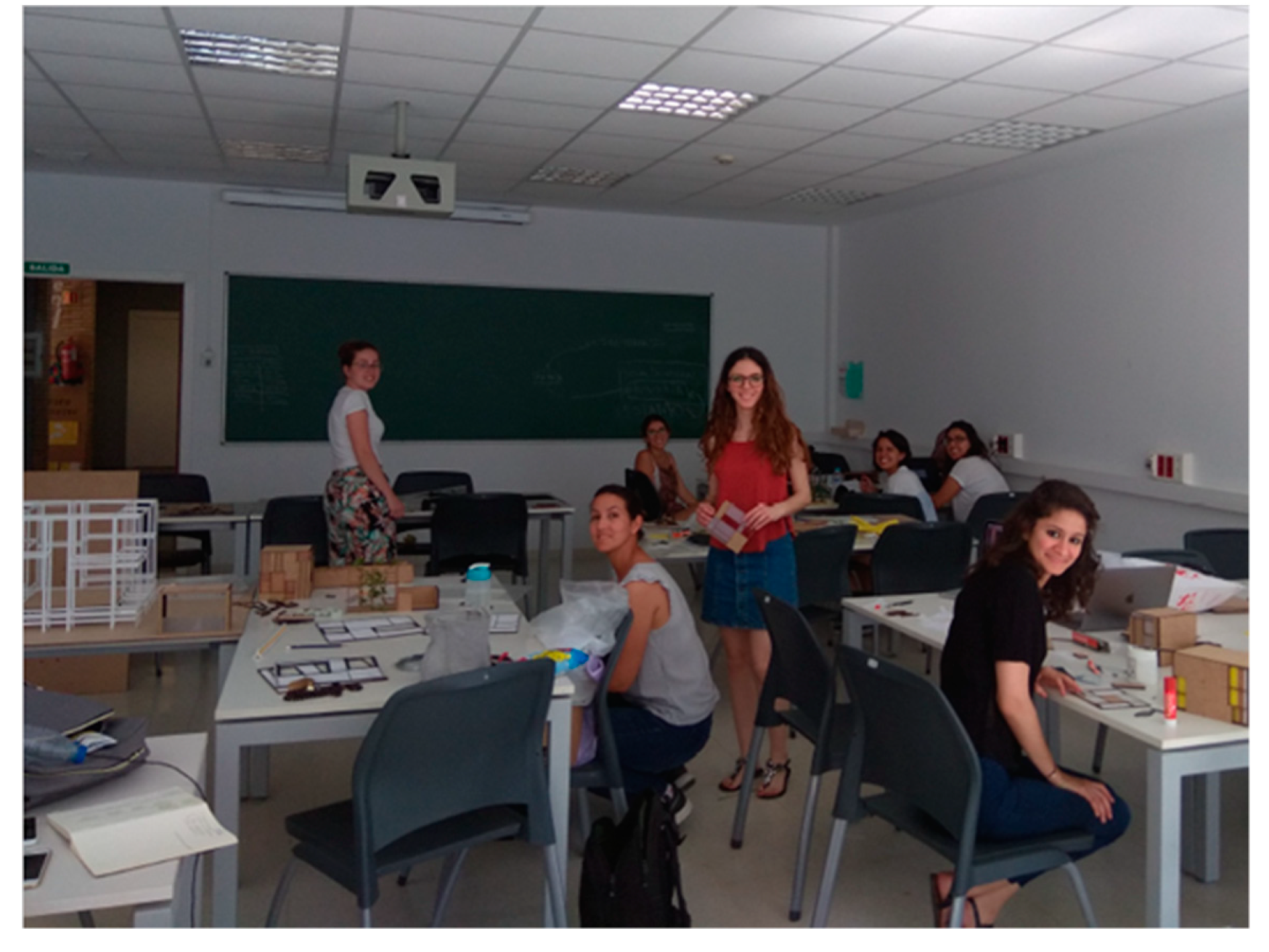
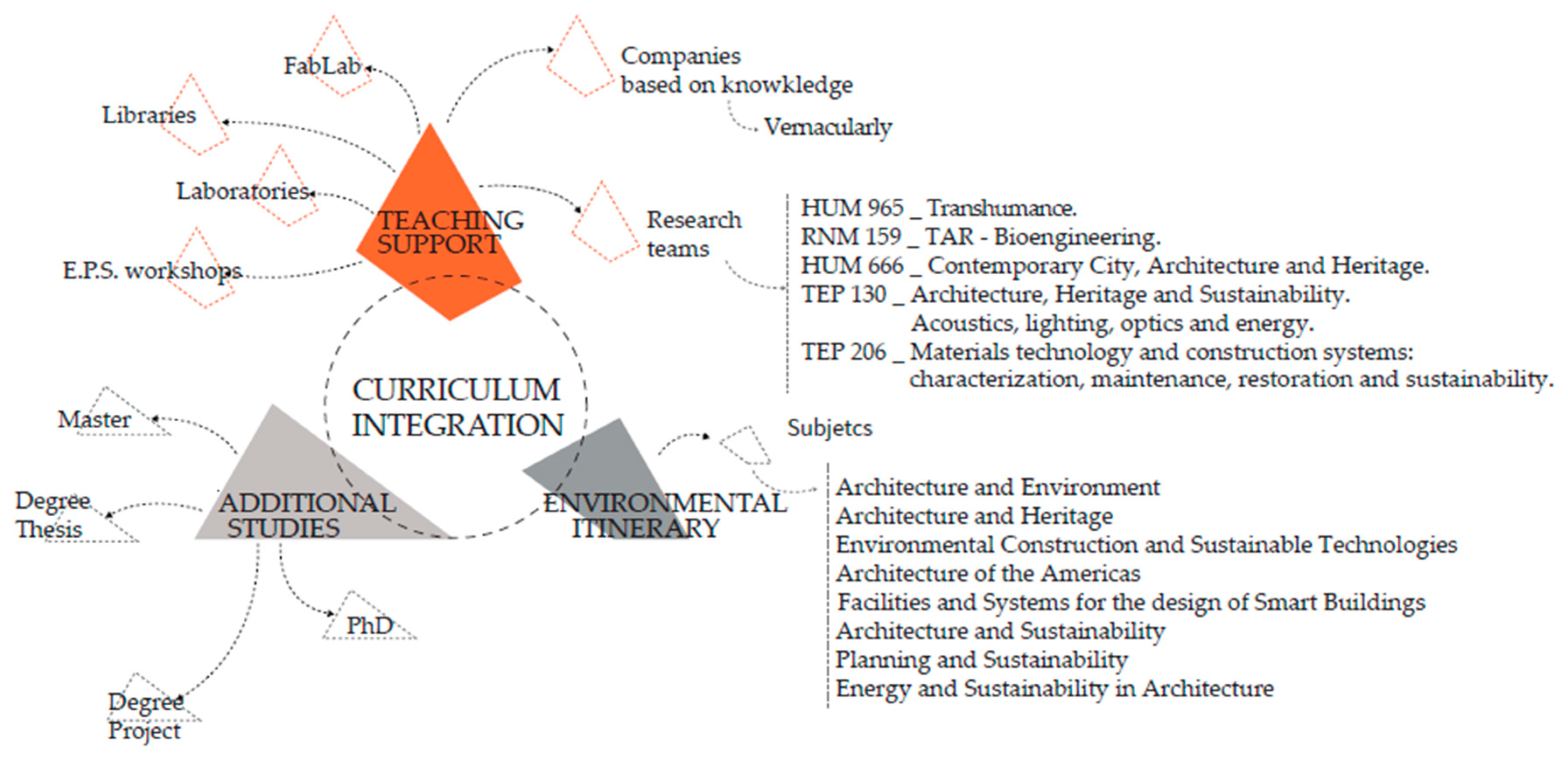
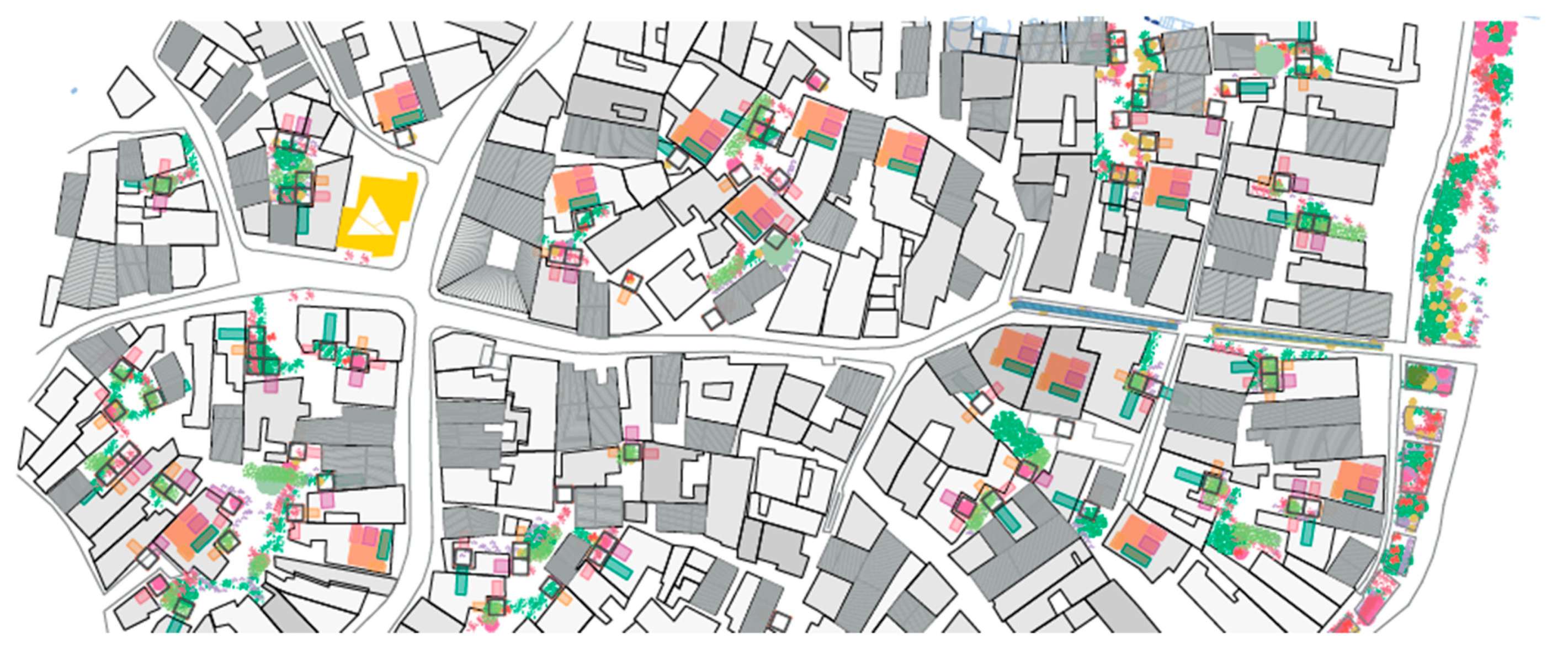
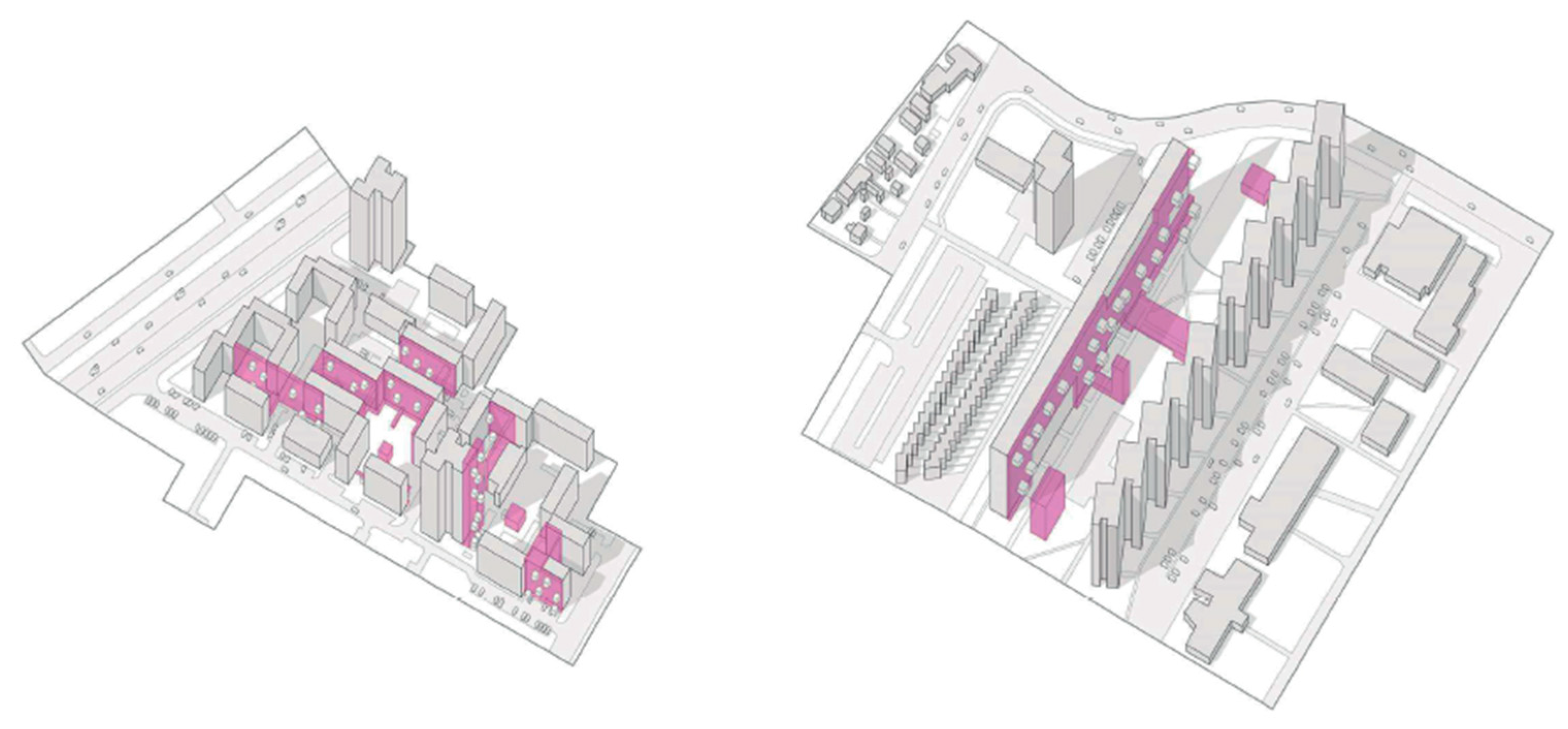
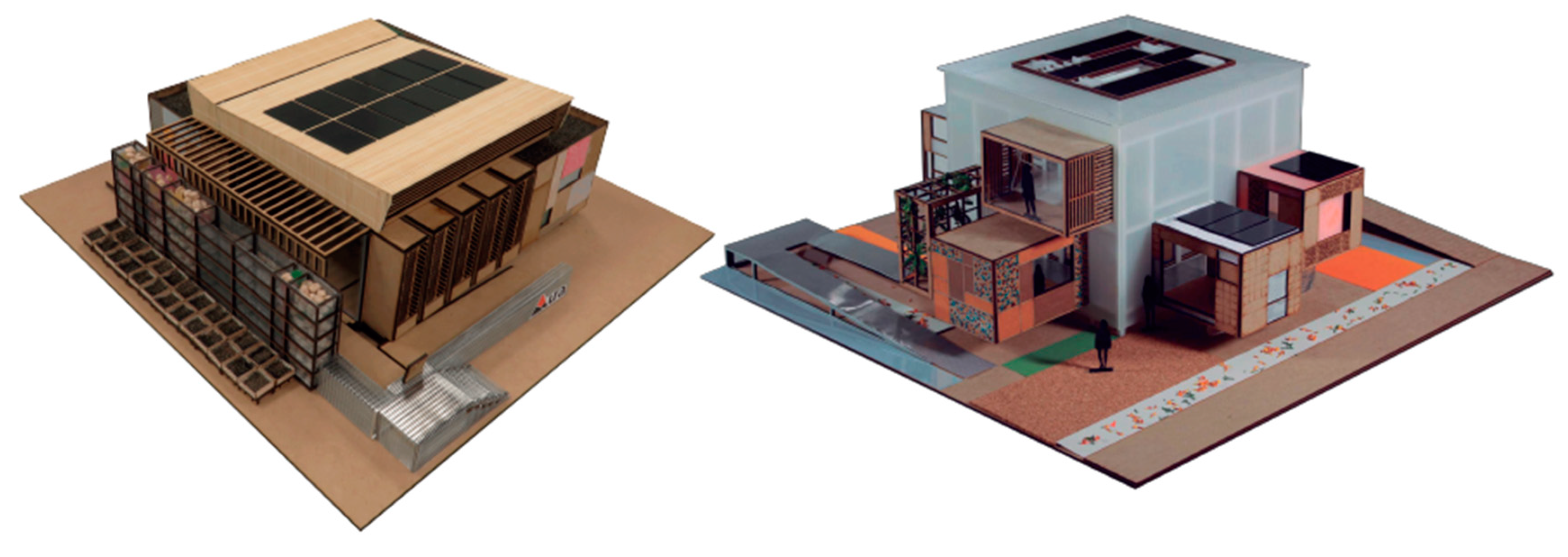
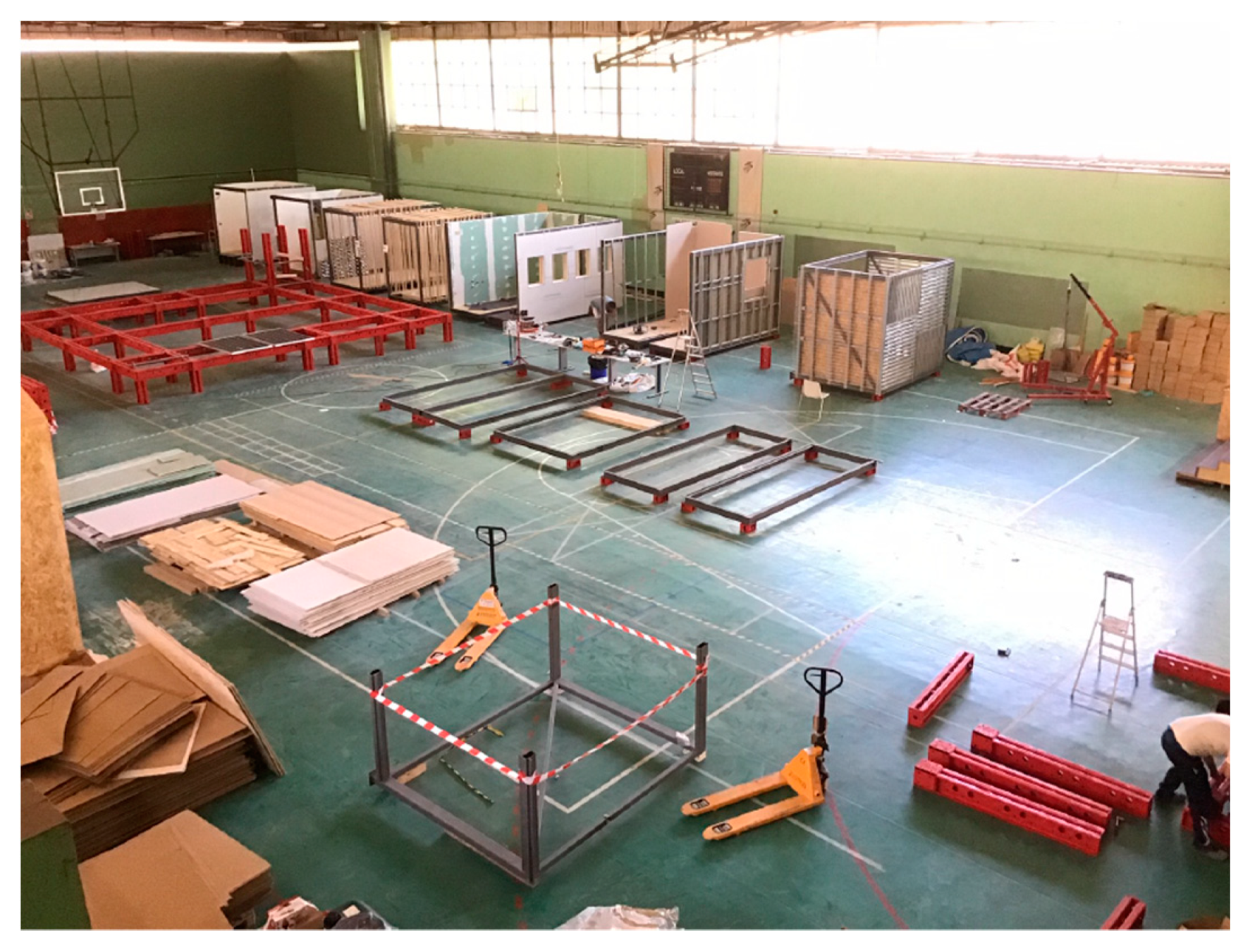
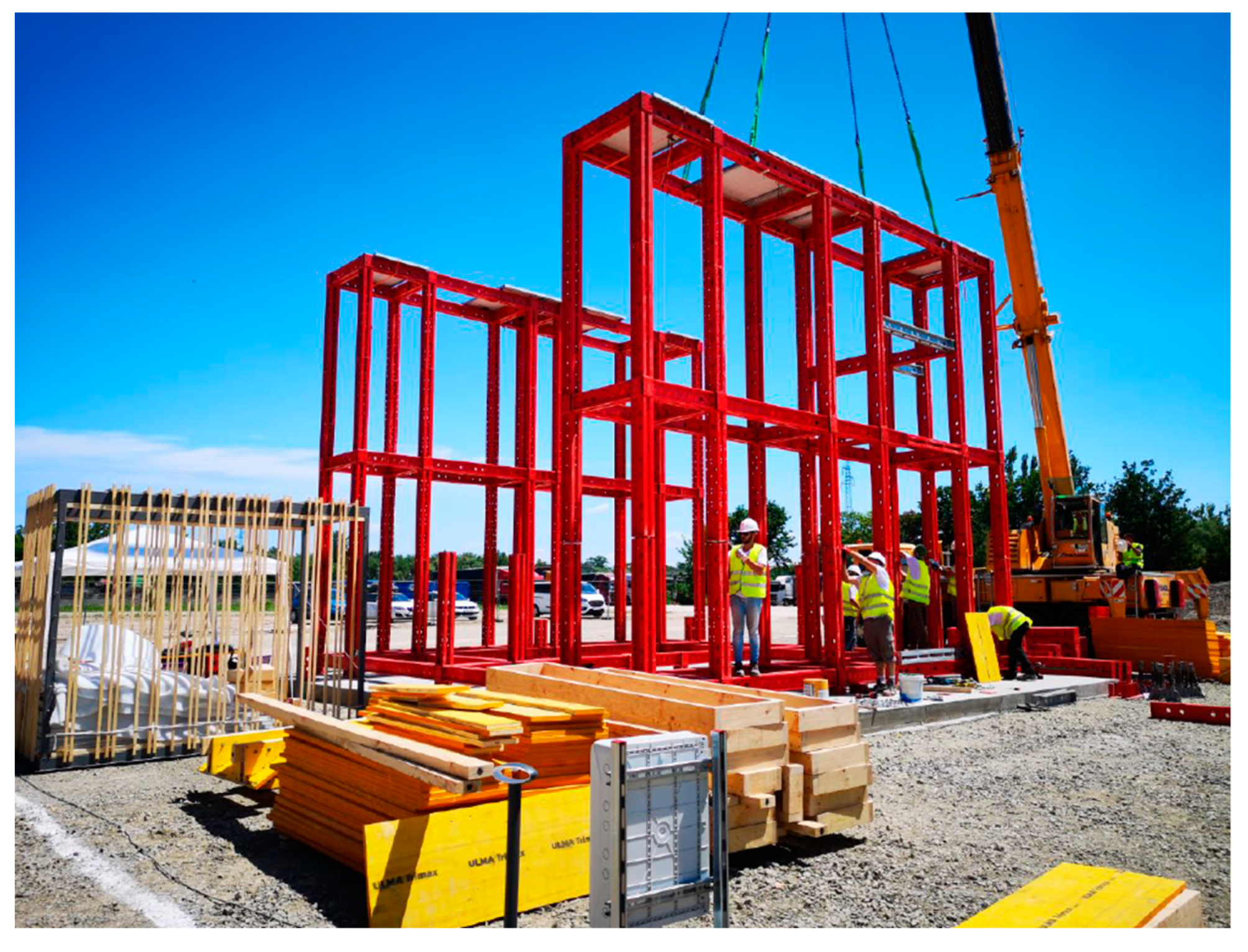
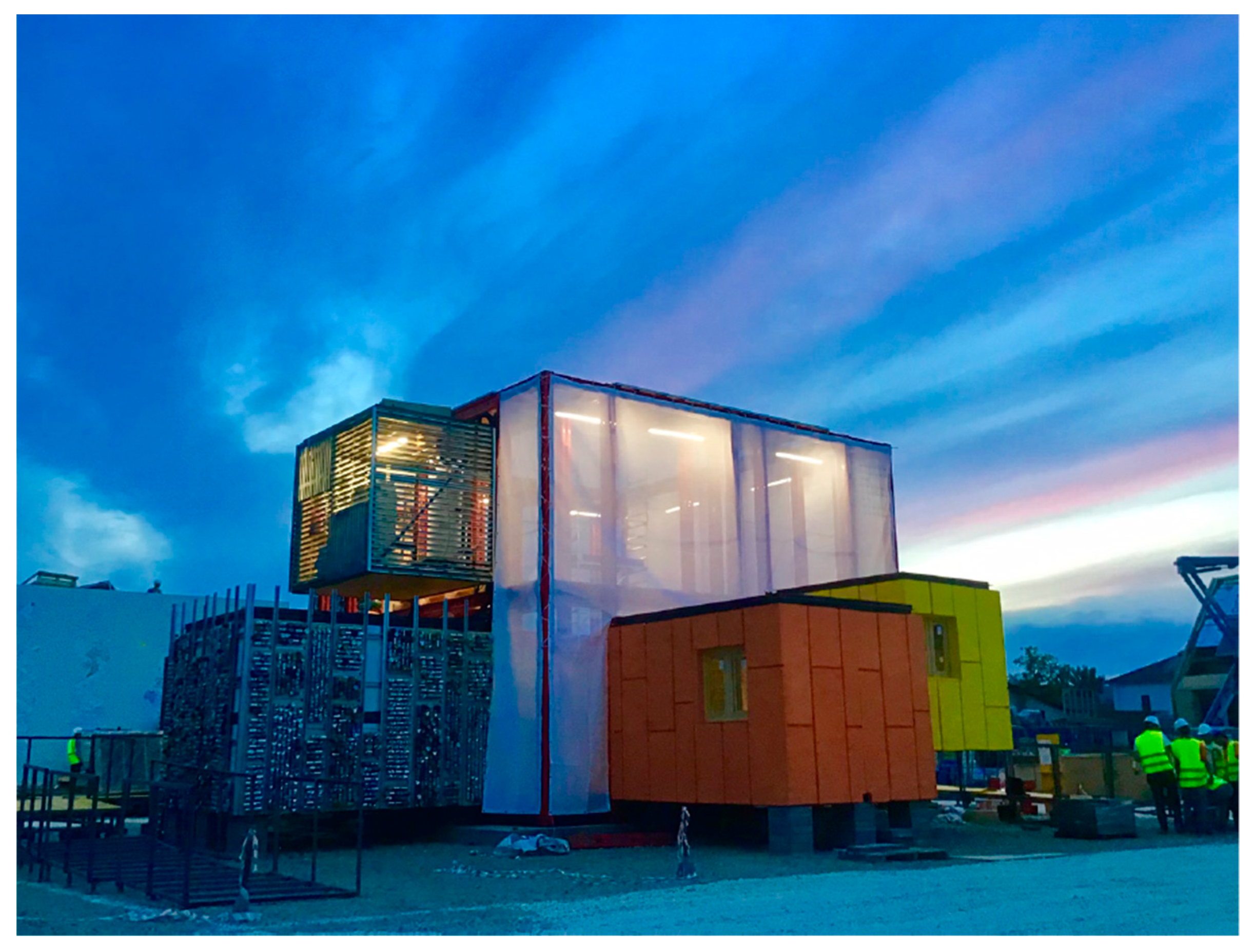
| Subjects | Year of Study | Type | Academic Year | Number of Credits | Degree Course | Number of Students |
|---|---|---|---|---|---|---|
| Projects 10 | 5th | Compulsory | 2017/2018 | 6 | Fundamentals of architecture | 23 |
| Environmental Construction and Sustainable Technology | 5th | Optional | 2017/2018 | 6 | Fundamentals of architecture | 5 |
| History, Theory and Architectural Composition 3 (HTCA3) | 4th | Compulsory | 2017/2018 | 6 | Fundamentals of architecture | 15 |
| Project 1 | 1st | Foundation | 2018/2019 | 6 | Fundamentals of architecture | 10 |
| Workshop 3 | 3rd | Compulsory | 2018/2019 | 6 | Fundamentals of architecture | 4 |
| Energy and Sustainability | 5th | Optional | 2018/2019 | 6 | Fundamentals of architecture | 24 |
| Environmental Construction and Sustainable Technology | 5th | Optional | 2018/2019 | 6 | Fundamentals of architecture | 20 |
| Facilities and Systems for the Design of Efficient and Intelligent Buildings | 5th | Optional | 2018/2019 | 6 | Fundamentals of architecture | 20 |
| Construction 6 | 5th | Compulsory | 2018/2019 | 6 | Fundamentals of architecture | 4 |
| Additional studies | Year of study | Type | Academic year | Number of credits | Degree course | Number of students |
| End of Degree project (TFG) | 5th | Compulsory | 2018/2019 | 6 | Fundamentals of architecture | 5 |
| End of Course Project (PFC) | 1st | Compulsory | 2018/2019 | 30 | Master in Architecture | 5 |
| Master’s Project (TFM) | 1st | Compulsory | 2018/2019 | 9 | Master in the City and Sustainable architecture | 6 |
| Total | 141 | |||||
© 2020 by the authors. Licensee MDPI, Basel, Switzerland. This article is an open access article distributed under the terms and conditions of the Creative Commons Attribution (CC BY) license (http://creativecommons.org/licenses/by/4.0/).
Share and Cite
Herrera-Limones, R.; Rey-Pérez, J.; Hernández-Valencia, M.; Roa-Fernández, J. Student Competitions as a Learning Method with a Sustainable Focus in Higher Education: The University of Seville “Aura Projects” in the “Solar Decathlon 2019”. Sustainability 2020, 12, 1634. https://doi.org/10.3390/su12041634
Herrera-Limones R, Rey-Pérez J, Hernández-Valencia M, Roa-Fernández J. Student Competitions as a Learning Method with a Sustainable Focus in Higher Education: The University of Seville “Aura Projects” in the “Solar Decathlon 2019”. Sustainability. 2020; 12(4):1634. https://doi.org/10.3390/su12041634
Chicago/Turabian StyleHerrera-Limones, Rafael, Julia Rey-Pérez, Miguel Hernández-Valencia, and Jorge Roa-Fernández. 2020. "Student Competitions as a Learning Method with a Sustainable Focus in Higher Education: The University of Seville “Aura Projects” in the “Solar Decathlon 2019”" Sustainability 12, no. 4: 1634. https://doi.org/10.3390/su12041634
APA StyleHerrera-Limones, R., Rey-Pérez, J., Hernández-Valencia, M., & Roa-Fernández, J. (2020). Student Competitions as a Learning Method with a Sustainable Focus in Higher Education: The University of Seville “Aura Projects” in the “Solar Decathlon 2019”. Sustainability, 12(4), 1634. https://doi.org/10.3390/su12041634





